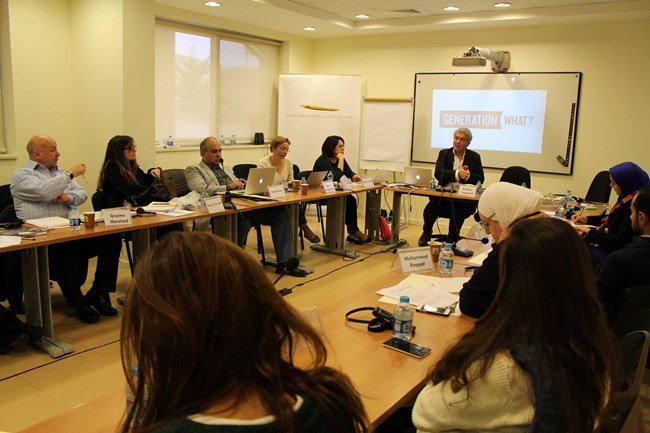Image:

05 Nov 2015
5 November 2015<br />
<br />
Experts, media professionals and civil society advocates working on youth issues gathered at the Jordan Media Institute (JMI) to discuss youth programing on national television stations. The two-day meeting on Wednesday, 4 November 2015 was entitled: What do Young People Want from their National Broadcaster?<br />
The effort was part of the "Youth on Screen" initiative which is funded by the EU and implemented by MedMedia and UNESCO-led NET-MED Youth program. The initiative aims at promoting TV programming that better responds to the needs of young people, facilitates their engagement and improves the portrayal of young women and men in its content.<br />
<br />
Her Royal Highness Princess Rym Ali, who briefly joined the meeting, said JMI was ready to help all parties concerned including civil society organizations and broadcasters in their efforts to give youth a voice and advance youth issues.<br />
JMI Dean, Dr. Basim Tweissi earlier addressed the opening session saying youth constitute the majority of Arab populations which could be a blessing but also a curse, especially in light of the challenges they face and the large number of young refugees who are out of schools.<br />
<br />
The participants discussed how national media and civil society could work together to enhance the participation of young people in public life, and how public service broadcasters can remain in touch with what young people want. In that regard, EU representative Barbara Engelstoft stressed the importance of building bridges between media and civil society and giving youth credible platforms to share their views.<br />
<br />
MedMedia Team Leader, Michael Randall said that there was an urgent need across the MENA region for broadcasters to engage with young people and gain a better insight into their interests and concerns. He added that civil society organizations in Jordan can play a key role in facilitating this process as well as helping national broadcasters to unlock the creativity of young Jordanians. While Rosario Soraide from the UNESCO NET-MED Youth program said the program seeks to empower young men and women, noting that youth were the source of inspiration and should lead the production process. <br />
<br />
The producer of a successful youth program in France, Christophe Nick presented a proposal for adapting the program “Generation What?” to the Arab world. The program, which is already being produced in several European states, seeks to capture the opinions of young people on a wide range of key issues including their relationships with themselves, their friends, family and society. It could also provide a unique comparison of attitudes and concerns across the Mediterranean region.<br />
The sessions also included a presentation of the "content lab" concept which is aimed at enabling young people to present their ideas and creative outputs to public service broadcasters and vice versa.<br />
<br />
JMI students also took part in the discussion and shared their views on the type of programming they need. They said young people were producing their own programs on the internet and would be happy to share them with local broadcasters. They stressed that there was no lack of talent in Jordan, but they needed funding opportunities and outlets to broadcast their work.<br />



